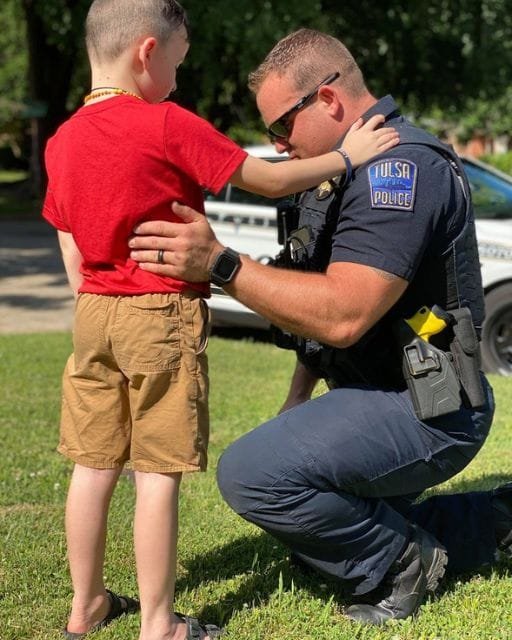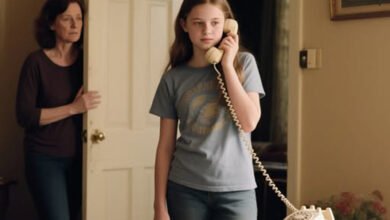HE ASKED THE OFFICER A QUESTION NO CHILD SHOULD EVER HAVE TO ASK.

The call came in as “disturbance at a residence.” Just another routine weekday morning. When Officer Daniels arrived, the front door was wide open and neighbors were watching from their porches. A young boy stood barefoot in the yard, wearing a red shirt and flip-flops that slapped against the pavement with every step.
Daniels approached slowly, hands open.
“Are you okay, buddy?” he asked gently.
The boy nodded, but it was clear he wasn’t.

He didn’t cry. He didn’t run. He just looked up at the man in the vest and dark sunglasses and asked,
“Are you the one who takes dads away?”
Daniels froze.
The boy stepped forward again.
“Because last time, the man wore a uniform. Like yours.”
As it turns out, the child remembered everything from the night his father was arrested—the noise, the fear on his mother’s face, the flashing lights that vanished quickly down the street. And now, another argument. Another call. Another officer standing on the grass.
Daniels knelt down.
He didn’t give a speech. Didn’t talk about justice or duty or safety. He simply placed a hand on the boy’s shoulder and said,
“I’m here to make sure everyone is safe. That includes you. That’s all I care about right now.”
The boy didn’t respond at first.
Then he did something unexpected—he wrapped his arms around Daniels’ neck and whispered something only the officer could hear.
And whatever it was… made Daniels stay there a little longer than necessary.
While still crouched on the grass, Daniels felt the weight of those small arms around his neck. The boy had whispered:
“Can you promise me my dad won’t get hurt this time?”
It was a hard question to answer. Daniels knew how these situations could go. Even when he tried to keep things calm, not everyone cooperated. Arrests could turn loud and chaotic. But as he looked into the boy’s hopeful eyes, something shifted inside him. This wasn’t just another call.
“I can’t promise what will happen,” Daniels said softly, “but I’ll do everything I can to make sure no one gets hurt. Okay?”
The boy nodded, still clinging to him as if letting go might make him disappear. Daniels gave him a small smile, stood up, and walked toward the house.
Inside was pure chaos. Shouting echoed through the hallway, broken dishes were scattered across the kitchen floor. A man—likely the boy’s father—was pacing with clenched fists. A woman sat slumped on the couch, tears running down her cheeks.
“Sir,” Daniels said firmly but calmly. “We need to talk.”
The man’s face was red with rage.
“What’s there to talk about? She called you again, didn’t she? Always running to the cops instead of handling it herself!”
Daniels raised a hand to stop him mid-rant.
“Look, I don’t know exactly what’s going on. But I do know there’s a scared kid outside. Let’s not make this worse for him, alright?”
That hit home. The man hesitated, then glanced out the window, where the boy still stood, watching silently. His expression softened slightly.
“Okay,” he said, sitting on the arm of a chair. “What do you want to know?”
Daniels sat across from him, speaking calmly. For twenty minutes, they talked—not about blame or punishment, but about options. The man had lost his job, was stressed out, and had turned to drinking. The fights with his wife had escalated, but neither of them really wanted to break up. They just didn’t know how to fix things.
By the end of the conversation, Daniels had convinced him to attend counseling sessions through the department’s family support program. He also arranged for a social worker to follow up the next week. It wasn’t a perfect solution—but it was a start. One without courtrooms or handcuffs.
When Daniels returned outside, the boy was still standing in the same spot. His feet were dusty from the dry grass, but his face brightened when he saw the officer approach.
“So… is he coming back?” the boy asked nervously.
Daniels smiled.
“He’s staying. And we’re going to help your family work through some tough stuff—together. There’s nothing to worry about today.”
The boy gave his first real smile since Daniels arrived. A smile of relief. One that made everything worth it.
As Daniels drove away later that day, he couldn’t shake the feeling that something bigger than himself had happened. Whether it was fate or coincidence, he knew now that he had made a real difference—and he quietly promised to start paying closer attention to calls like that from then on.
A few weeks later, Daniels received a letter in the mail. It was written in large block letters and addressed directly to him. He opened it during his lunch break at the station.
Dear Officer Daniels,
Thank you for letting my dad stay at home. We went to talk to someone who helps us talk about our feelings.
My mom says we’re learning how to listen better.
Every night before bed, Daddy gives me a hug and promises not to drink anymore.P.S. I drew a picture for you. It’s my family holding hands. You’re in it too because you helped us.
Attached was a colorful drawing of stick figures under a bright yellow sun. One of them—standing proudly next to the smiling family—wore a badge.
Daniels stared at the drawing for a long time, his chest tightening with emotion. He hadn’t thought much about the long-term impact of that day—but now he understood. That simple moment had mattered. It reminded him why he joined the force in the first place: to serve, to protect, and, when possible, to heal.
Word of the letter quickly spread through the department. Some colleagues teased him for being a “softie,” but most were genuinely moved. Several officers began volunteering for community outreach programs focused on preventing domestic issues before they escalated.
The boy’s family, meanwhile, kept attending therapy and slowly began to rebuild their life. Years later, Daniels ran into the boy—now a teenager—at a local park. The young man recognized him instantly and jogged over to shake his hand.
“I never forgot what you did for us,” he said sincerely. “You changed everything.”
Daniels chuckled, both proud and humbled.
“I was just doing my job, kid. But it looks like you’ve done pretty well too.”
And in that moment, Daniels reflected on the true power of patience and empathy. Solving problems wasn’t always about enforcing laws. Sometimes, it was about listening, understanding, and helping people rewrite the stories they thought were already written.
Not every conflict needs force. Sometimes, our greatest tool for lasting change… is compassion.
If this story touched you, please share it. Let’s keep spreading reminders of kindness, and the quiet strength that can transform a life—even with a simple promise.





